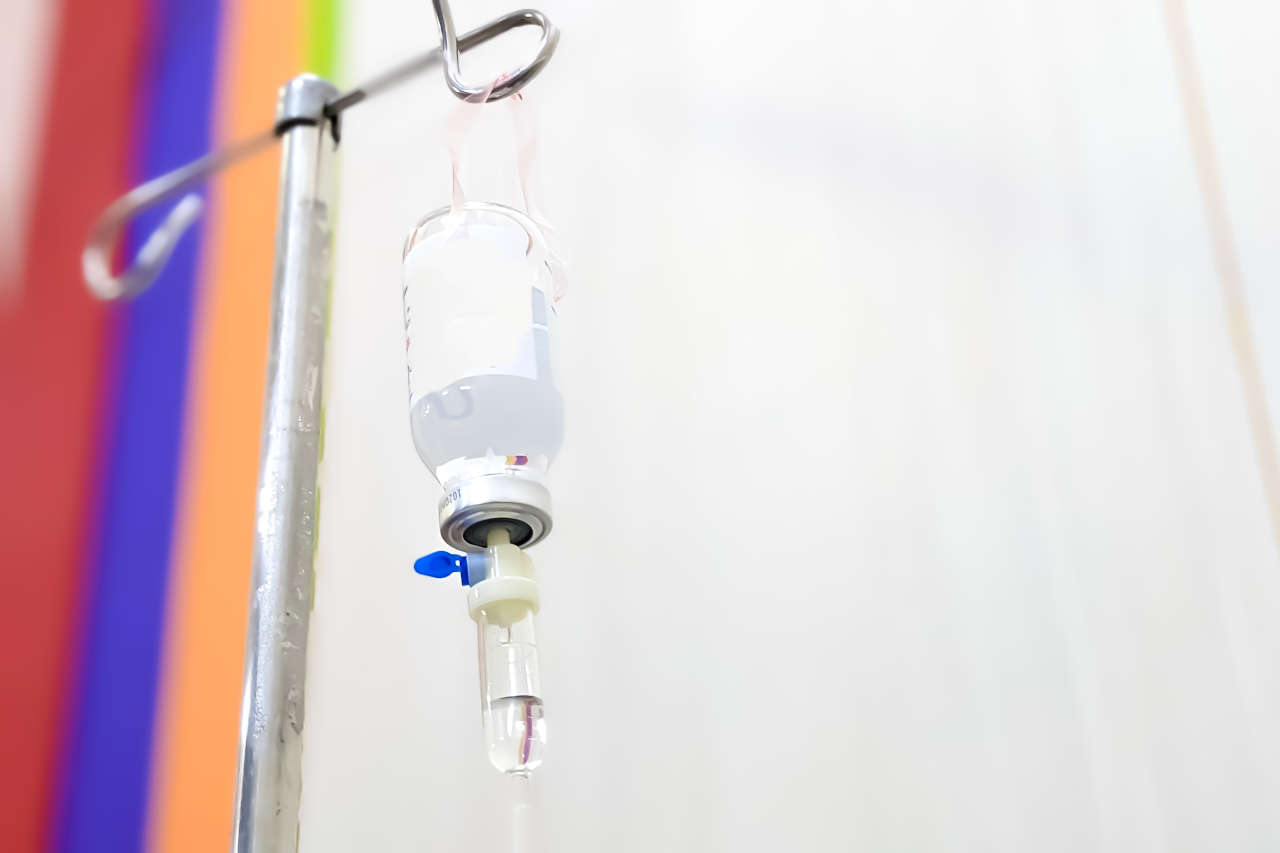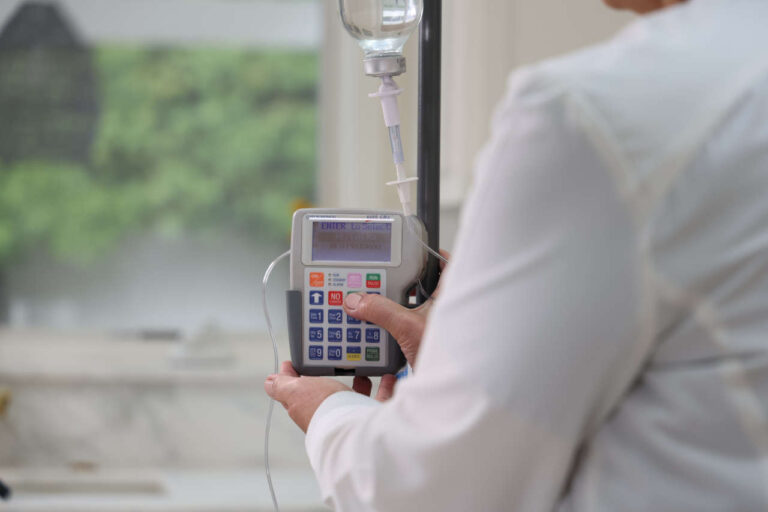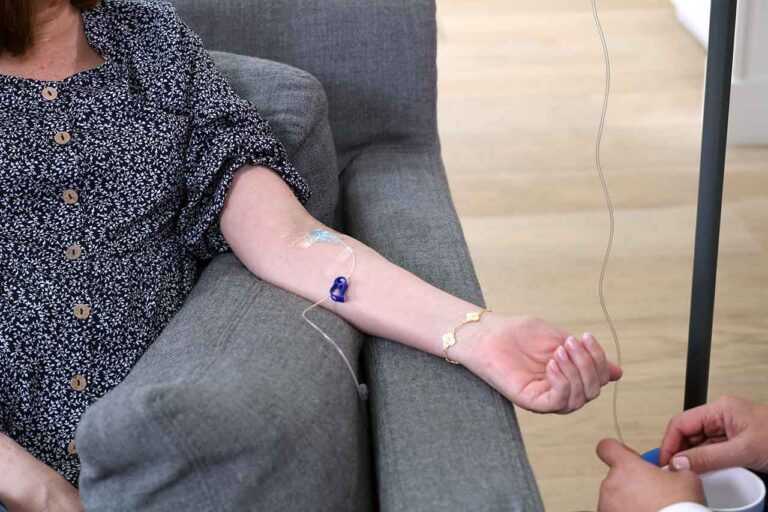
Though rare, IVIG complications can be fatal. Learn about the symptoms, occurrence rate, and risk factors.
Get IVIG Copay Assistance – Speak to a Specialist
IVIG (intravenous immune globulin) is a life-saving therapy for many autoimmune and inflammatory disorders. It is generally well tolerated, and most side effects are mild, such as flushing, headache, malaise, fever, chills, and fatigue.
However, severe complications may occur in some people, depending on the specific IVIG products and individual differences.
Anaphylaxis
Anaphylaxis is a severe, potentially life-threatening allergic reaction. In anaphylaxis, the immune system floods the body with several chemicals, causing a sudden drop in blood pressure, shortness of breath, and generalized hives. Other signs and symptoms include:
- Weak and rapid pulse
- Nausea
- Vomiting
- Diarrhea
- Dizziness
- Fainting
Anaphylaxis is one of the rarest IVIG complications, with only 23 cases reported in the scientific literature until 2017 [1]. According to reports, severe anaphylaxis occurs in about 20 out of 1 million infusions [2].
The risk of anaphylaxis may be higher in individuals with IgA deficiency. Most anaphylactic reactions occur in people younger than 18 and during their first IVIG administration.
Most IVIG products today have very low IgA levels, further cutting down the risk.
Arrhythmia
Arrhythmia (irregular heartbeat) is also one of the rarest IVIG complications and the least investigated. In arrhythmia, the heart beats too slowly, too quickly, or has an irregular rhythm.
Only a handful of studies have looked into IVIG-associated heart rhythm issues.
For example, in 2015, Turkish researchers reported a case of irregularly fast heartbeat during IVIG infusion in two newborns [3]. It was the first case of IVIG-associated arrhythmia in newborns.
However, they couldn’t establish a cause-and-effect relationship and concluded it could have been a coincidence.
Likewise, a 2023 investigation found a higher incidence of cardiac arrest and irregularly fast heartbeat in those receiving IVIG [4]. Cardiac arrest is a medical emergency in which your heart stops beating suddenly.
While most cases are transient, heart rhythm abnormalities can be fatal.
Your doctor will likely recommend cardiac monitoring during an infusion, especially if you have a history of cardiac disorders.
Acute Kidney Failure

Acute kidney failure or acute kidney injury (AKI) is a rapid loss of kidney function. As a result, waste products accumulate in the blood. Symptoms of AKI include:
- Decreased urine output
- Swelling in the legs, ankles or feet
- Shortness of breath
- Fatigue
- Irregular heartbeat
- Chest pain or pressure
Severe kidney damage can lead to seizures, coma, or death.
Symptoms typically appear within the first 10 days after starting IVIG and are generally reversible. Nonetheless, temporary hemodialysis may be necessary in about 30% of the cases.
IVIG-associated AKI is a well-known but rare IVIG complication. The exact incidence is unknown but is thought to affect less than 1% of all individuals receiving IVIG [5].
How IVIG causes kidney injury is still under investigation. However, the following factors may increase the risk:
- Older age (65 or older)
- Diabetes
- Concomitant use of medicines that damage the kidney (nephrotoxic medicines)
- Products that contain sucrose or mannitol
- History of kidney disease
- Rapid, high-dose infusion
If you fall into a high-risk group, your doctor will check your kidney function before each IVIG infusion. They may also reduce the dose or infusion rate, ask you to stop taking nephrotoxic drugs, or switch to subcutaneous immune globulin (SCIG).
Treatment Info | Get IVIG Prior Authorization
Transfusion-Related Acute Lung Injury (TRALI)
IVIG-associated TRALI is a serious and potentially fatal IVIG complication. It is defined as a new acute lung injury (ALI) that develops during or within 6 hours of infusion.
Symptoms include:
- Rapid breathing
- Shortness of breath
- Fever
- Low blood pressure
- Rapid heart rate
The exact incidence of IVIG TRALI is unknown, possibly due to underreporting and misdiagnosis.
Likewise, how IVIG causes TRALI is unclear. However, case reports suggest rapid, high-dose infusions may increase the risk [6].
Treatment is supportive and involves measures to ensure proper breathing and fluid balance.
Aseptic Meningitis
Aseptic meningitis is a rare but significant IVIG complication. In IVIG-induced meningitis, the membranes surrounding your brain and spinal cord (meninges) become inflamed.
The main features of IVIG-induced meningitis are:
- Headache
- Neck stiffness/pain
- Extreme light sensitivity (photophobia)
Most cases are reported during the first infusion. Studies suggest nearly 7 cases of meningitis occur per 10,000 infusions.
The mechanism of IVIG-induced meningitis is poorly understood.
Health experts believe meninges may become inflamed due to the direct toxic effect of immunoglobulins or the hypersensitivity reactions elicited by other components in the product. Rapid, high-dose infusions, dehydration, and being female may increase the risk.
Though a potentially serious complication, IVIG-induced meningitis is unlikely to cause death [7].
REFERENCES:
- Williams, Sharon Julie, and Sudhir Gupta. “Anaphylaxis to IVIG.” Archivum immunologiae et therapiae experimentalis vol. 65,1 (2017): 11-19. doi:10.1007/s00005-016-0410-1
- Martinez, Carlos et al. “Intravenous immunoglobulin and the current risk of moderate and severe anaphylactic events, a cohort study.” Clinical and experimental immunology vol. 206,3 (2021): 384-394. doi:10.1111/cei.13665
- Tufekci, Sinan et al. “Cardiac rhythm abnormalities during intravenous immunoglobulin G(IVIG) infusion in two newborn infants: coincidence or association?.” Clinical case reports vol. 3,9 (2015): 731-4. doi:10.1002/ccr3.329
- Melhem, Racha Abi, et al. “Cardiac Sequelae of Intravenous Immunoglobulin Infusion.” Journal of Allergy and Clinical Immunology, vol. 151, no. 2, Feb. 2023, p. AB330. https://doi.org/10.1016/j.jaci.2022.12.765.
- Orquera, José David et al. “Severe Acute Kidney Injury Secondary to Immunoglobulin Infusion in Life-Threatening Guillain Barre Syndrome.” Bulletin of emergency and trauma vol. 10,1 (2022): 44-48. doi:10.30476/BEAT.2021.85702.1103
- Ray, Sanghamitra et al. “Transfusion-Related Acute Lung Injury due to Iatrogenic IVIG Overdose in Guillain-Barre Syndrome.” Journal of pediatric neurosciences vol. 14,3 (2019): 140-142. doi:10.4103/jpn.JPN_47_19
- Kretowska-Grunwald, Anna et al. “Intravenous Immunoglobulin-Induced Aseptic Meningitis-A Narrative Review of the Diagnostic Process, Pathogenesis, Preventative Measures and Treatment.” Journal of clinical medicine vol. 11,13 3571. 21 Jun. 2022, doi:10.3390/jcm11133571













